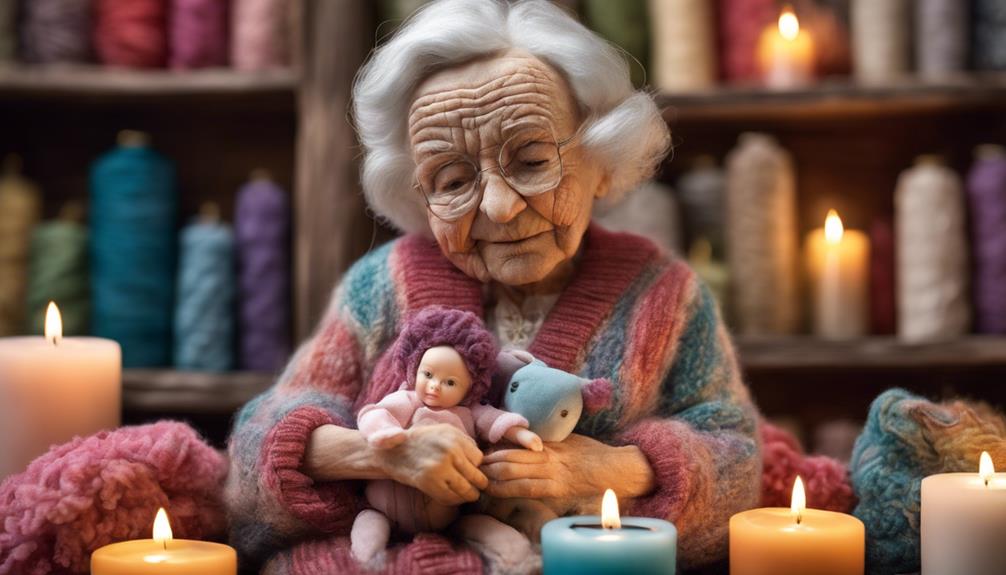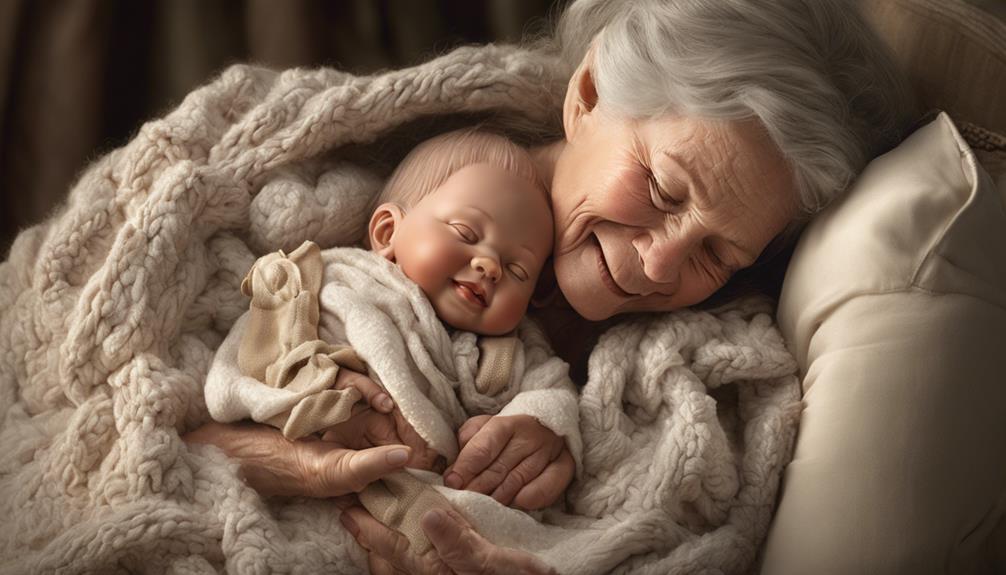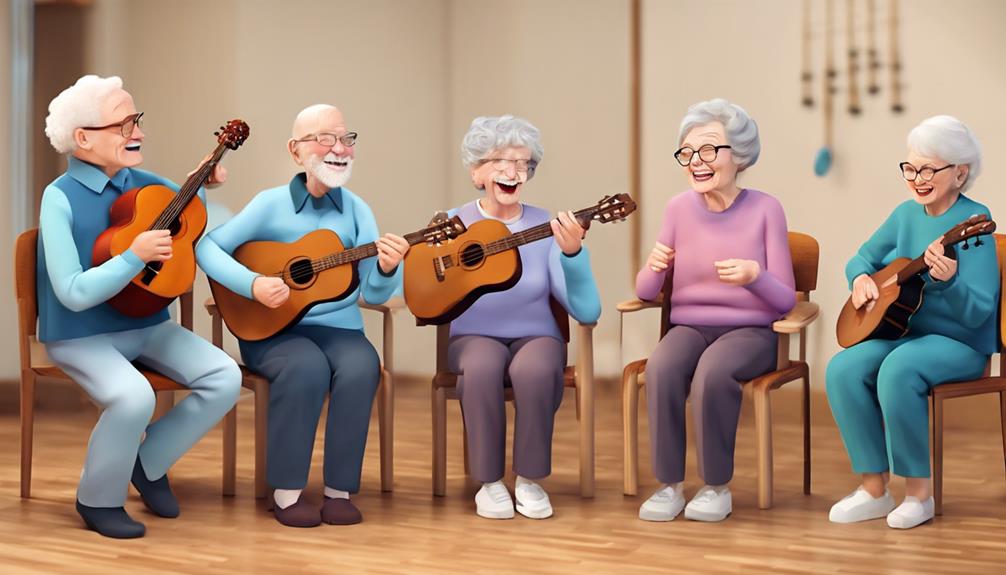Research findings have brought attention to the potential benefits of using baby doll therapy in treating dementia, revealing a rise in positive behaviors and a decrease in agitation among patients.
The benefits of baby doll therapy extend beyond mere activities, offering a unique approach to nurturing well-being in care settings.
Let's uncover the various ways in which this innovative form of therapy can positively impact the lives of those living with dementia, fostering a sense of connection and enhancing their quality of life.
Key Takeaways
- Baby doll therapy promotes emotional well-being and reduces loneliness.
- Sensory stimulation activities enhance cognitive function and provide comfort.
- Reminiscence therapy fosters memory recall and reduces feelings of isolation.
- Creative engagement activities encourage pretend play and storytelling for connection.
Benefits of Baby Doll Therapy
Baby Doll Therapy offers significant benefits for individuals with dementia, enhancing their self-esteem and overall well-being. The use of baby dolls in therapy has been shown to evoke positive emotions and memories, providing comfort and companionship for those with dementia. This form of nurture therapy creates opportunities for natural interactions and social engagement, fostering a sense of connection and belonging in individuals who may feel isolated or lonely.
Research indicates that expressing affection through touch with baby dolls fulfills a fundamental human need for physical contact and emotional connection, leading to improved mood and decreased agitation in dementia patients. The benefits of baby doll therapy go beyond simple enjoyment; it can also stimulate cognitive function and encourage sensory stimulation, contributing to a holistic approach to dementia care.
Sensory Stimulation Activities

Amid the myriad benefits of Baby Doll Therapy for individuals with dementia, exploring sensory stimulation activities emerges as a pivotal element in enhancing their emotional well-being and cognitive engagement. Engaging residents in sensory activities with baby dolls can evoke positive emotional responses and improve overall well-being.
Here are some practical sensory stimulation activities that can be incorporated into baby doll therapy sessions:
- Using soft, textured fabrics to engage residents with dementia.
- Incorporating scented items like lavender sachets or vanilla-scented dolls for calming sensory experiences.
- Tactile activities such as brushing the doll's hair or dressing it in different textures to enhance sensory stimulation.
- Playing soothing music during doll therapy sessions to create a multi-sensory experience.
- Providing opportunities for residents to engage in sensory activities that promote a sense of comfort and connection with their environment.
Reminiscence Therapy Ideas
When implementing reminiscence therapy for individuals with dementia, utilizing familiar objects and memories can profoundly enhance cognitive function and emotional well-being. Reminiscence therapy involves tapping into past memories, photos, music, and familiar objects to evoke positive emotions and connections in dementia patients. By engaging in activities like looking at old photographs, listening to music from their era, or discussing past experiences, we can stimulate memory recall and improve overall well-being. This type of therapy not only boosts cognitive function and communication but also reduces feelings of isolation, depression, and anxiety in individuals with dementia. By fostering connections with their past, reminiscence therapy provides a sense of identity, purpose, and comfort. Below is a table illustrating some practical reminiscence therapy ideas using dolls to nurture well-being through past memories:
| Activity | Description | Benefits |
|---|---|---|
| Doll Dress-Up | Dressing dolls in outfits from the past and discussing memories associated with them. | Stimulates memory recall and encourages communication. |
| Doll Tea Party | Hosting a pretend tea party with dolls, reminiscing about past social gatherings. | Promotes social interaction and emotional connections. |
| Doll Family Stories | Creating stories about a doll family, reflecting on personal family experiences. | Encourages storytelling and sharing of family memories. |
Creative Engagement Activities

Drawing on the therapeutic benefits of engaging in creative activities with baby dolls, residents with dementia can find joy and stimulation through a variety of interactive experiences. When caring for a loved one through doll therapy, incorporating engaging activities is essential.
Here are some ideas to nurture your loved one's well-being:
- Dressing Up: Dressing the dolls in different outfits not only stimulates memories but also enhances motor skills.
- Pretend Feeding: Participating in pretend feeding sessions with the baby dolls fosters a sense of nurturing and care, promoting emotional connection.
- Stroller Walks: Encouraging residents to walk with the baby dolls in strollers not only promotes physical activity but also enhances mobility and coordination.
- Tea Parties: Organizing baby doll tea parties allows residents to interact and engage with each other through role-playing activities, fostering social connections.
- Storytelling: Engaging residents in storytelling sessions where they create narratives involving the baby dolls can enhance communication skills and cognitive abilities, providing a creative outlet for self-expression.
These activities can bring immense joy and fulfillment to both the caregiver and the individual receiving care.
Promoting Happiness and Contentment
Promoting happiness and contentment for individuals with dementia through baby doll therapy involves fostering emotional well-being and enhancing feelings of companionship. Doll therapy serves as a source of comfort, allowing individuals to express their emotions and engage their nurturing instincts. By interacting with baby dolls, positive memories are evoked, leading to a sense of joy and well-being.
The companionship provided by these dolls helps reduce feelings of loneliness, creating a connection that promotes overall happiness. Activities such as dressing and cuddling the dolls bring comfort and a sense of fulfillment to residents. Through emotional expression facilitated by baby doll therapy, individuals with dementia can experience increased quality of life and a deeper sense of connection to the world around them.
Embracing this form of therapy can truly make a difference in nurturing the emotional needs of those in care.
Frequently Asked Questions
How Can Dolls Enhance the Wellbeing of People With Dementia in Residential Care?
Dolls enhance the wellbeing of people with dementia in residential care by providing comfort, companionship, and reducing anxiety. Engaging with dolls allows individuals to maintain functional abilities, promoting a sense of normalcy and routine.
This interaction stimulates memories, emotions, and social behavior. Residents benefit from doll therapy through increased social interactions, expression of unmet needs, and decreased agitation.
What Does Baby Doll Therapy Provide for Dementia Patients With?
Baby doll therapy provides comfort and companionship for dementia patients, reducing feelings of loneliness and isolation. It stimulates memories and emotions, creating tender moments and positive experiences.
Engaging with baby dolls allows patients to express affection through touch, fulfilling their need for connection. Placing dolls in communal areas fosters social engagement among residents.
This therapy offers immense comfort, promoting well-being and emotional stability even in advanced stages of dementia.
What Are 3 Things to Never Do With Your Loved One With Dementia?
When caring for a loved one with dementia, we must remember to avoid negative language, arguments, and rushing them. These actions can lead to frustration and distress.
Instead, we should focus on providing emotional connection, comfort, and validation. It's crucial to respect their memories and perceptions, even if they differ from reality.
What Are Coping Strategies for Dementia Patients?
When it comes to coping strategies for dementia patients, we focus on:
- Engaging in familiar activities
- Encouraging social interactions
- Creating a calming environment
By offering sensory stimulation and implementing structured daily routines, we help manage challenging behaviors and reduce anxiety.
Providing emotional support and reassurance is key to helping dementia patients feel secure and less overwhelmed. These strategies promote well-being and enhance the quality of life for those living with dementia.
Conclusion
In conclusion, baby doll therapy in dementia care settings offers a multitude of benefits, including:
- Sensory stimulation
- Reminiscence therapy
- Creative engagement
- Promoting happiness
By incorporating these activities into residents' daily routines, we can nurture their well-being and enhance their quality of life.
It's crucial to continue researching and implementing these strategies to ensure the best possible outcomes for individuals living with dementia. Let's strive to provide compassionate and effective care that truly makes a difference in their lives.









